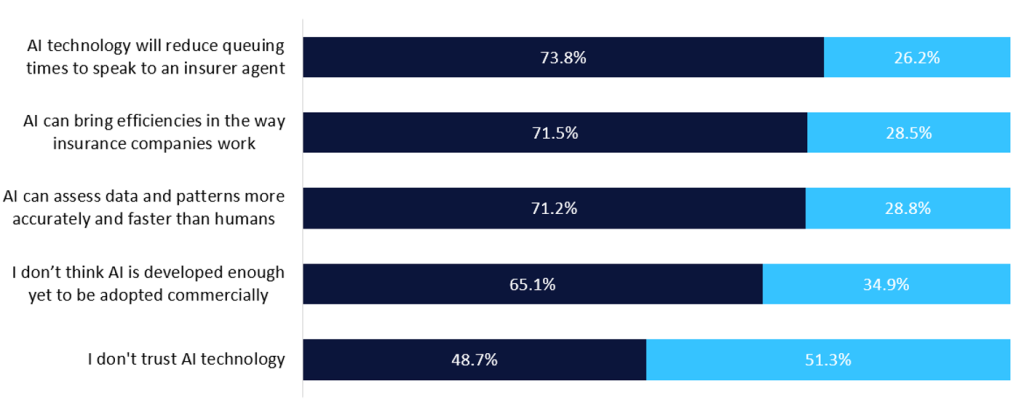Global consumers unanimously acknowledge the benefits of deploying artificial intelligence (AI) tools in insurance yet are sceptical about their commercial rollout, as per a GlobalData survey. While satisfaction is high when interacting with AI-powered tools, insurers will need to build customer trust as the technology becomes more ingrained in operations.
According to GlobalData’s 2024 Emerging Trends Insurance Consumer Survey, there is a strong belief that AI can reduce queuing times to speak to insurance agents, as cited by 73.8% of consumers. Meanwhile, a slightly lower proportion of consumers believe the use of AI can result in operational efficiencies (71.5%), while also citing the technology is better at pattern recognition than humans (71.2%).
Do you agree or disagree with the following statements? 2024

Notwithstanding, there are challenges that insurers must tackle to ensure consumers will happily use the AI tools they are investing in and deploying, as most find that the technology is not sufficiently developed to be adopted at scale, eroding their trust. Ensuring transparency in AI-driven decisions will be key to overcoming trust issues, and this will be of utmost importance among those who perceive that such tools are programmed with a bias, such as providing negative claim outcomes. Others may have concerns over data privacy or may just prefer interacting with a human, or at least prefer having the possibility to do so if interacting with automated tools is frustrating them. As such, it is imperative for insurers to be present across all channels so that consumers do not perceive that they are pushed to use online or automated channels, with assistance over the phone or face to face offered if desired. Despite scepticism surrounding the use of AI tools at a commercial scale, and perhaps even reluctancy, satisfaction levels among customers using such tools are high. Further findings from GlobalData’s survey reveal that 74.5% of customers using insurance chatbots were either satisfied or very satisfied by the experience. This has been further echoed by claims made by Lemonade, an insurtech relying exclusively on AI to process claims without any input whatsoever of human agents. At a keynote speech at the 2025 Insurtech Insights Europe conference, Lemonade’s founder proclaimed to have seen its customer satisfaction levels increase every time tasks are moved from humans to AI.
Most certainly, the use of AI will transform the insurance industry in several ways and will also drive operational efficiencies and cost reductions. For instance, the availability of AI tools brings a new paradigm in that assistance or customer support can be provided 24/7, while the automation of claims processing leading to reduced settlement times will naturally be viewed favourably by consumers. At the same time, the speed and precision of AI in pattern recognition means that risks can be quantified more accurately and policies priced more fairly, while fraud detection can be improved. While all in all, AI has the potential of considerably improving satisfaction rates in insurance, the need for the human touch and empathy in engagements continue to limit its full potential. Better communication surrounding AI’s capabilities and nuances will ultimately lead to improved adoption rates.








